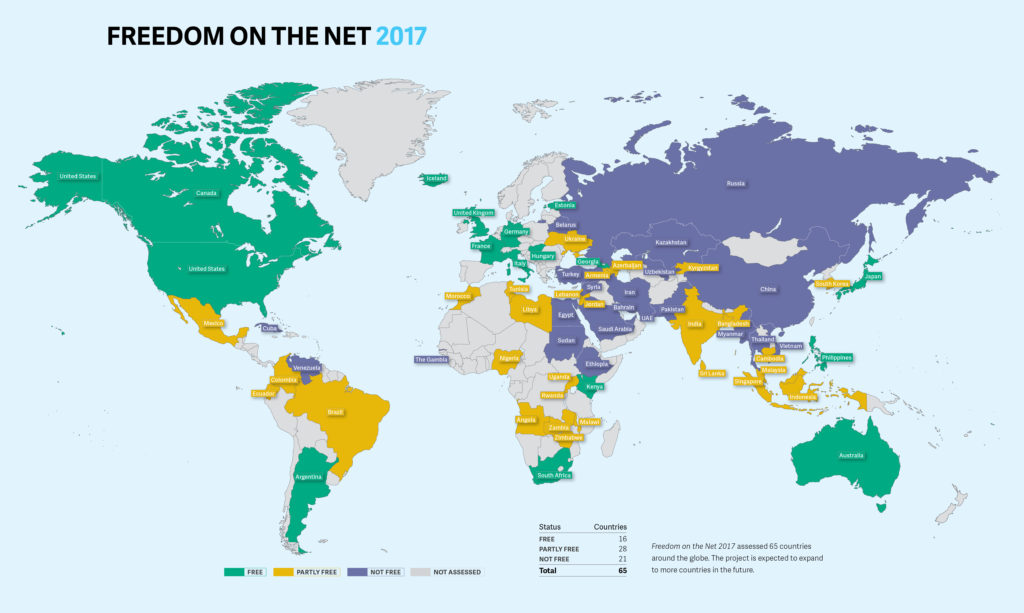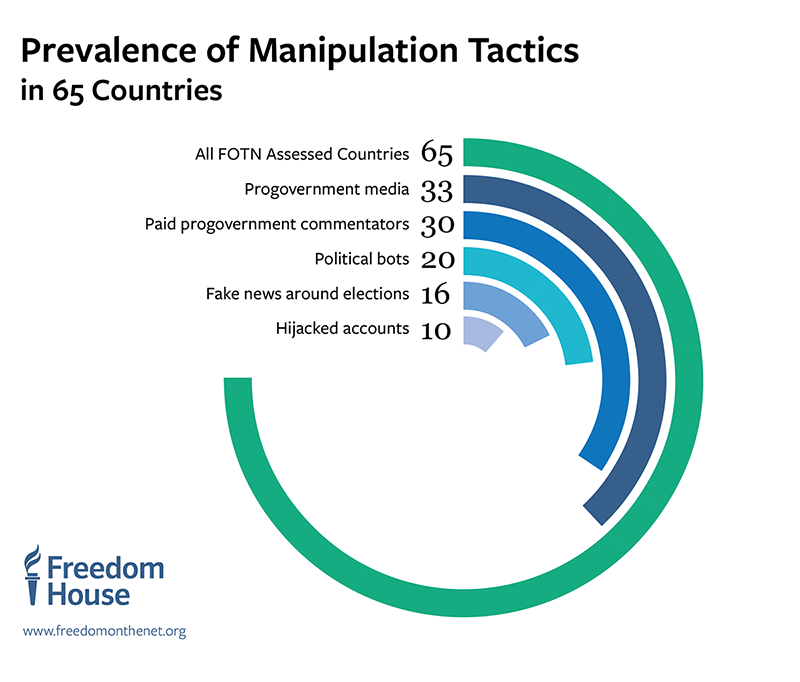 Once again this year I authored the Canada Report for Freedom House‘s Freedom on the Net 2017. It’s worth saying (as I did last year) how much I think it’s an honour to do so. But it’s easy to establish that we are pretty lucky in Canada in comparison to a lot of places. Let’s take a look at how much it sucks to be in…
Once again this year I authored the Canada Report for Freedom House‘s Freedom on the Net 2017. It’s worth saying (as I did last year) how much I think it’s an honour to do so. But it’s easy to establish that we are pretty lucky in Canada in comparison to a lot of places. Let’s take a look at how much it sucks to be in…
China
China leads the way in being the least free, for the 3rd year running. They have a score of 87, which is crap. The way the scoring works, the higher your number the less free you are on the net. Overall there are three categories – 1. Obstacles to Access; 2. Limits on Content; and 3. Violations of User Rights. They are scored out of 25, 35, and 40 respectively, for a total of 100. By comparison to 87, I scored Canada at 15 (third most free in the world!). Iceland was the winner at 6. As part of China’s 87, they scored a “perfect” 40 out of 40 in violations of user rights. Yegads. Let’s see what the legal environment is like with regard to your “rights” in China:
The constitution cannot generally be invoked in courts as a legal basis for asserting rights. The judiciary is not independent and closely follows party directives, particularly in politically sensitive freedom of expression cases. Government agencies issue regulations to establish censorship guidelines. These are highly secretive and subject to constant change, and they cannot be challenged by the courts. Prosecutors exploit vague provisions in China’s criminal code; laws governing printing and publications; subversion, separatism, and antiterrorism laws; and state secrets legislation to imprison citizens for online activity. Trials and hearings typically lack due process.
Think about that next time you get into a Twitter beef. And if you think your privacy takes a beating here in Canada, try this:
Privacy protections under Chinese law are minimal. In the words of one expert, the law explicitly authorizes government access to privately held data, and “systematic access” to “data held by anyone” is a realistic possibility once e-government strategies are fully implemented
Russia
Russia scored a 66, clearly in the “not free” range of scores. You go ahead and say what you want about Trudeau, but think about this:
Facing major antigovernment protests across Russia in 2017 and a presidential election scheduled for March 2018, the authorities scrambled to tighten control over the internet. Lawmakers took every opportunity to push through legislation aimed at curbing unchecked expression of dissent online.
And if you are an LGBTI person in Russia, forget it. You will be censored and fined for saying and doing things related to your community online. Russia has passed a shitload of laws that gets stuff banned and removed from being online. The “authorities have wide discretion to block content online”. Good luck reading this blog in Russia.
Russia banned LinkedIn because it refused to have its data about Russian users stored on Russian servers. I don’t know how I could live without those LinkedIn emails that “Jimmy is celebrating a work anniversary.” Wait, maybe that’s not so bad…
Saudi Arabia
Sure, you think of Saudi Arabia as a pretty reasonable place (US ally! oil!) compared to some of its Middle East neighbours. You are wrong. Scored a 72. Basically you can’t see or say anything:
The Saudi government continued to employ strict filtering of internet content throughout 2016 and early 2017. Self-censorship remained prevalent when discussing politics, religion, and the royal family.
Sites about the Shia minority, women, human rights, political organizations and otherstuff like that are routinely blocked. How’d you like to live in this place:
Authorities have also blocked the website of the Islamic Umma Party, the country’s only political party, which operates underground because political parties are illegal
The more you know. The section for “Prosecutions and Detentions for Online Activities” is a fucking scary thing to read. Many 10-year and more sentences for things like creating a website “that could disturb the social order”. That is essentially the definition of online activism.
Venezuela
Venezuela went from “partly free” in 2016 to “not free” in 2017, scoring a 63. Apparently having your economy collapse and your government in crisis is bad for internet freedom!
Let us pause for a moment to check out how prevalent misinformation and manipulation is on the Net now:

Fake news! Which brings us to…
The United States
Of course the United States is free, scoring a very respectable 21 and tying for 5th. However, it scored 18 last year. And it’s the least free it’s been in all the years Freedom House has measured this (since 2011). Let’s copy some bullet points of some of the things going wrong down South:
- Social media were flooded with hyperpartisan and fake content during the 2016 presidential election campaign. Russian-operated social media accounts and state media engaged in disinformation and influence campaigns to polarize the media environment
- Journalists writing about political or social topics faced an uptick in antisemitism, death threats, and harassment on social media in the lead-up to the election
- Under new leadership, the Federal Communications Commission announced its intention to roll back net neutrality protections
Oof.
Some final thoughts
The overall report has the title “Manipulating Social Media to Undermine Democracy”. That’s… not good! The internet is supposed to spread democracy, not hurt it. The report notes that “online content manipulation contributed to a seventh consecutive year of overall decline in internet freedom”. World, we need to do better dammit.
Finally, I would like to dedicate my work on the Canada report to the authors of the following country reports – Angola, Bahrain, Bangladesh, Belarus, Cambodia, China, Egypt, Ethiopia, Rwanda, Philippines, Russia, Saudi Arabia, Thailand, Tunisia, Turkey, United Arab Emirates, Vietnam, Zambia and Zimbabwe. Do you know who those authors are? Neither do I, because they had to remain anonymous to write their reports, undoubtedly for fear of reprisals by the authorities in their countries. I’m pretty darn lucky to be where I am.
Sorry for the relatively serious post. We now return you to our usual snark.

Allen good report. I got some bones to pick. First Saudi Arabia has an internet ten points better than the home of Edward Snowden, blasphemy.
Second even if its true which I doubt, Russia spending a hundred thousand dollars to influence a two billion dollar election is news and worth debate? Sure I can see how dividing America could make Russia stronger, however from what I see of Putin he would give a bullet to the head of anyone who brought such a stupid proposal to him.
Furthermore talk about the kettle and the pot, the USA has a finger in every pie, IMHO they have swung elections in democratic countries that I know, and I would not be surprised that some former
Prime Ministers have CIA paycheck on the Christmas tree.
Third I plead ignorance, but if everything you do on the internet
is captured and held forever, is this an intellectual prison that should be like doping an internet crime of mind mining?
We need another measure of internet freedom. At the minimum, how much of the time you spend on the internet is pro bono, and how much is chargeable hours.
there is a chance I do not understand math when it comes to scoring
The scoring confuses even me – and I do it!
I am now very convinced that Russia has been scored a little better than Saudis. IMHO this organization that you are a member in good standing with has some gravitas. I cant help but think about Amnesty International and Doctors without borders. That is a trieficate of freedom and human decency that should be our common cause.
I love , no in fact I hate when administrations use Amnesty International to make a case one day, and then pour phospous
into a civilian population the next day, and keep a straight face.
Your doing Gods work Allen, because God does not exist and someone has to pick up the slack.
Steve
my text messages have privacy thanks to the supreme court, so I hope this extends to email. The idea of illegal snooping was the mail, and that should extend to all communications. If society can not get bye
with freedom, well did it deserved to exist?
ooh that’s good steve!
stand by for a post about that SCC case…
the great thing about the end of net neutrality is that the process
respected the law
https://arstechnica.com/tech-policy/2017/12/dead-people-among-millions-impersonated-in-fake-net-neutrality-comments/
Its a game of risk, its a game of thrones
and today if you want to rule
you have to control the internet
Facebook has proven that
humans are nothing but
border collies with
better vocal diaphragms
So know everything
tied into the sheeple
mind which was
long ago idenifed
as a soft target
becomes incredibly
commatized
send in the forty foot
containers because
in the end
thats what the liqiators
due.
they come to your
home
gather up your assest
through you out in the
street as part of the
process
and then move
on
maybe there is a housing
bubble in Nigera
and they are short
on big screen tv
and king sized
beds
well I happen
to have a surpluss
in texas
so lets
do
economics
101
comparative advantage
for both parties
Texas can sleep
and watch TV
like Nigeria
You know I could
go on an on with
this song
but it would
make like
absolute zero
difference